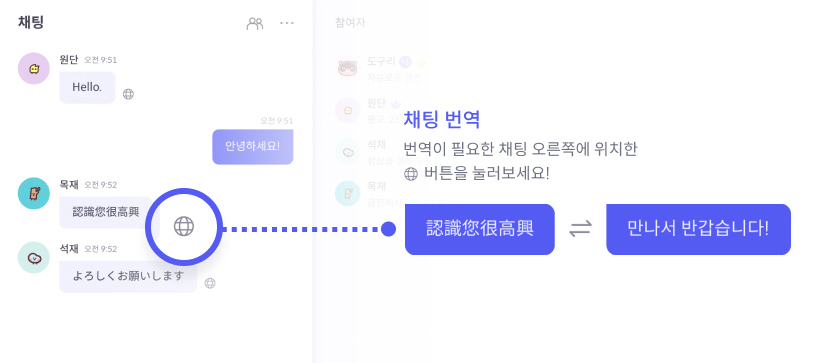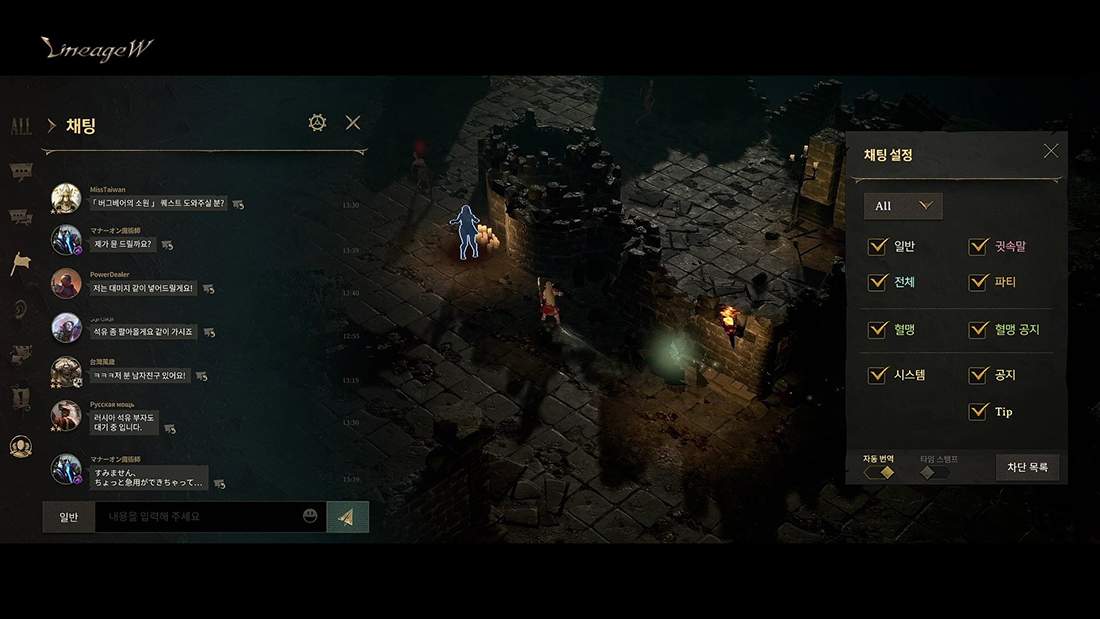During the Lineage W Global Showcase held on August 19th, 2021, NC announced its plans to offer Lineage W as a global one-build service, allowing gamers from different countries to play together on a single server. To enable seamless communication between players speaking different languages, the game incorporates an AI translation technology that translates chat messages in real time.
In this article, we will introduce the artificial intelligence (AI) translation engine called “NCMT (NC Machine Translation),” which serves as the foundation for the chat system in Lineage W. NC, the first domestic game company to develop its own machine translation engine, officially launched its service by implementing this technology in its cross-play service “PURPLE” starting from April 2021. Users from Korea, Japan, and Taiwan can utilize “PURPLE Talk” to have bidirectional translations. We will delve into the development process that NC underwent to enhance the technical quality and translation accuracy of NCMT, ensuring that it smartly translates every game term, slang, and abbreviation into the target language.


NC, the First Domestic Game Company to Develop Its Own AI Translation Engine
Effective communication among gamers is a vital aspect of the gaming experience. Within games, players collaborate with guild members to strategize, engage in battles, share rewards, and embark on adventures to new territories. Through endless conversations and interactions, they experience fun and joy. NC games strongly emphasize community activities where people gather to play. In the same game, players have the opportunity to meet new people and create unique stories, allowing them to encounter various forms of joy each time.
As NC expanded its global presence and introduced games tailored for international audiences, the company faced the challenge of enabling gamers from diverse countries to enjoy playing together. It was crucial to preserve the game's intention and enjoyment, while also overcoming the language barrier and facilitating meaningful communication. Consequently, the development of translation technology became essential in addressing this issue.
The Language AI Lab, a division of NC’s NLP (Natural Language Processing) Center, began its research in 2019 in collaboration with the Localization Division responsible for game localization. After two years of dedicated research and development, they successfully integrated the technology into NC’s cross-play platform called “PURPLE.” This accomplishment made NC the first game company in South Korea to create its own AI translation engine using internal expertise and apply it to its game services.


English-Chinese (Taiwan) Translation: the application of the translation technology to the PURPLE platform
Currently, in NC’s cross-play service “PURPLE,” which utilizes NCMT, users can enjoy all the games available on the platform through the real-time bidirectional translation feature. Through “PURPLE Talk,” NCMT provides real-time bidirectional translation between Korean and English, and it supports a total of four languages: English, Japanese, Chinese, and Korean. In addition to the bidirectional translation between Korean and English, NCMT also provides bidirectional translation between Chinese, Korean, and English in Taiwan, and between Japanese, Korean, and English in Japan.
Creating Specialization & Differentiation of Technology in the Gaming Domain
In translating game chat, it is essential to capture not only the everyday conversations of users but also the unique language and terminologies specific to the gaming domain. And who better understands the terminologies created by users than the game company itself?
The Language AI Lab, operating under the NLP (Natural Language Processing) Center, has been actively developing various technologies, including game chat spam filtering, automatic generation of bulletin hashtags, and analysis of user opinions in bulletin boards. Even before the advent of machine translation technology, NC has been building AI models, leveraging machine learning resources, and acquiring technical expertise to enable machines to comprehend specialized terminologies and abbreviations commonly found in gaming.
In addition, the Localization Division, responsible for localizing all games for overseas markets, has been consistently conducting research to ensure that the original essence and enjoyment of the games are effectively conveyed to global users. Interestingly, it was the Localization Division that initially conceptualized the machine translation service for game chat. They collaborated with the Language AI Lab, requesting their expertise to review the technical development and devise a high-level strategy that prioritizes the users who would benefit from the service and determines the order of technology implementation.
The Language AI Lab developed a deep learning-based machine translation model specifically tailored to the games and languages at hand. They meticulously constructed the necessary training data, designed and developed a suitable structure, and assumed responsibility for the live operation of the model. Throughout this process, the Localization Division played a crucial role in bridging NC’s machine translation technology with their services, actively identifying the needs of global users. Their involvement extended beyond the establishment of a simple database, as they also took charge of tasks such as machine translation service planning, project management, and business development.
Before delving into the development of the translation engine, it was crucial to have a comprehensive understanding of the content and unique aspects of each game, as well as the cultural nuances of users from different regions. The data collected during this phase was then utilized to enhance the translation engine, leading to an overall improvement in the quality of game translation. This achievement can be attributed to the technology’s customization according to the specific needs of users. Consequently, NC was able to establish its specialization in the gaming industry, a domain that typically demands expertise beyond that of general machine translations.
ㅋㅋㅋ ➡ lol ➡ WWW (Japanese equivalent of ㅋㅋㅋ or lol) — Efforts for Natural Translation to the Target Language
NCMT specializes in effectively translating gaming jargon and slang. In gaming, users often employ informal and unrefined language in their expressions. Understanding and accurately translating the slang and jargon specific to each game, including abbreviations and game-specific terms commonly used among gamers, became a top priority. To tackle this challenge, NCMT leverages AI technology to automatically identify slang expressions in chats and spoken language from various countries. With the support of the Localization Division, these expressions are then translated to suit other languages and further refined through machine learning. NC is actively engaged in data research, not only generating a vast amount of data but also effectively detecting new expressions and consistently incorporating them into the training data.
What would be the result if a typical translating machine translated “또르륵 월창에 공지 떴어요! 늦어서 ㅈㅅㅇ”? The NCMT translation would show the following result: “:’( There's a notice on world chat tab! Sorry I'm late.”


“또르륵” was translated as :’(, the term “월창” was translated to “world chat tab,” and “ㅈㅅㅇ” to “sorry,” which are terms commonly used in American culture, while preserving the speaker’s intentions.
Many people assume that Japanese, which shares the same word order as Korean, is relatively easy to translate, but this is not necessarily the case when it comes to translating game jargon. Japanese words are often written in Hiragana instead of Kanji (the writing that uses Chinese characters) or even further abbreviated to save time and effort in writing the full word. This is similar to the phenomenon in Korea where users abbreviate “감사합니다” (thank you) as “ㄱㅅ” (ty, 10Q or thnx). Users can understand the situation through domain and context, so there is no need for them to use difficult Chinese characters when communicating with each other.


In Taiwan, Traditional Chinese characters are utilized, but there is a distinction compared to China — instead of the Roman Pinyin system, a Zhuyin (phonetic symbol) keyboard is used. Taiwanese users sometimes simplify their language while engaging in activities or general chat within games. Furthermore, some younger users employ Zhuyin symbols instead of Chinese characters, presenting a challenge for conventional translation tools to accurately translate such expressions. Even those with expertise in the Chinese language may encounter difficulties in comprehending the abbreviated language used in gaming. However, through the efforts of researchers, the occurrence of translation errors in games has been significantly reduced. They have achieved this by providing insights into the unique cultures and phenomena found in each country and incorporating these patterns into their training data.


Translating games can present challenges that cannot be solely addressed through data and technology. Chat languages encompass various phenomena that may be difficult to grasp unless one is a local fluent in the specific language. To tackle this obstacle, the Localization Division, along with local experts and researchers proficient in the respective languages, joined forces to ensure that NCMT provided smooth and accurate translations. The collaboration between the development team and the local teams made it possible to overcome these challenges and deliver high-quality translations.
Conversations That Prioritize Respect
In any country, there is always a presence of unfriendly and derogatory expressions directed towards foreigners, making it challenging to eliminate them from online platforms. To tackle this issue, NCMT has adopted a principled approach when it comes to political terms and derogatory expressions. The aim is to ensure that the machine does not comprehend or translate such language, while simultaneously striving to convey the intended meaning of the sentence without conveying a demeaning impression. NCMT has been specifically designed to convey the overall intention of a sentence, particularly in scenarios where two users, who do not understand each other’s language, may inadvertently employ derogatory expressions during their conversation.
When Taiwanese or Chinese use the term “洋鬼子 (yangguizi)” to belittle Westerners, NCMT has been programmed to transliterate the term as “yangguizi” rather than translating it as “western devil.” On the other hand, to prevent explicit communication, the term “dog eater,” which is used by Westerners to demean Asians, is transliterated with a different sound rather than being translated directly as “狗食者 (dog eater)” and is rendered as “都基塔 (do-ghi-tap) or do-ghi-ter.”
Keeping Up with NC's Globalization
The development of NCMT was not without its challenges, and there are ongoing obstacles that lie ahead. NC is rapidly catching up with companies that have been working on translation technologies for the past 10 to 20 years, but there are still numerous languages and technical complexities that need to be addressed. Each time a new language is incorporated, NCMT requires several million to tens of millions of words for training data. Therefore, NC places significant emphasis on enhancing the quality of NCMT to reach a level of native proficiency, rather than focusing solely on providing quick translations at the expense of accuracy. The goal is to enable users to communicate seamlessly and share their enjoyment when NCMT is integrated into globally oriented games. NC intends to implement NCMT in Lineage W, which has launched worldwide simultaneously, in order to break down the language barrier that inevitably arises during global in-game battles. To support unrestricted communication among users of NC games expanding to overseas markets, NC plans to progressively expand its language services to encompass East Asian and European languages.


Note: This image is a staged scene for the showcase, not an actual in-game screenshot
NC plans to continue utilizing NCMT to develop and localize global content, as well as to listen to and analyze feedback from global customers in order to provide services from various perspectives. Additionally, NC will strive to expand the scope of its translation technology to include other professional fields such as finance and media.
 Facebook
Facebook  Twitter
Twitter  Reddit
Reddit  LinkedIn
LinkedIn  Email
Email  Copy URL
Copy URL 









